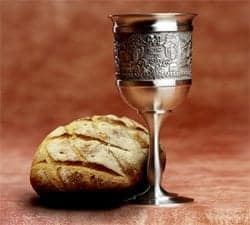We must be careful not to slip into the assumptions of modernity, thinking that the principalities and powers, against which we do battle, have somehow disappeared in our enlightened age. And we must also take care not to misunderstand the nature of these principalities and powers, which is always in this world, most respectable.
We are summoned to do battle against them, but too often we want to fight fire with fire. We want laws for their laws, actions for their actions, lobbyists to counter their lobbyists, and so on. But God’s way is not our way; His thoughts are not our thoughts—although we are commanded to learn the process of making them our thoughts. We are engaged in the process of becoming more and more like Jesus, who is the true Israel of God.
And so, in this meal, we are partaking of the body and blood of Jesus. We declare, each week, by means of a broken body and spilled blood that God has determined before the foundation of the world to overthrow pagan power with divine weakness. The cross was the place where the weakness of God collided in a spectacular way with the strength of pagan man—and paganism and idolatry were toppled forever.
So Jesus is on the throne now, with a name that is above every name, precisely because He suffered, bled, and died on a cross of wood. Among other things, this is what we declare each week in this meal. We preach the weakness of God, now given the name above all names.
But we do more than preach this weakness of God. We eat it. We drink it. We chew and swallow weakness. We become what we eat, and we are partaking of that weakness so that we might become weak in the same way. This is not the weakness of unbelief, not the weakness of man. We are partaking of Christ’s sufferings that we might also be joined with Him in His resurrection and enthronement.
So come, and welcome, to Jesus Christ.


